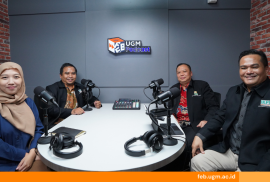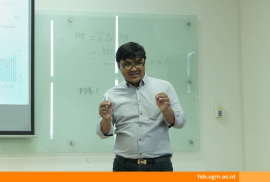On Saturday (12/6) the Studies Center for Information System, Studies Center for Accounting Education, and Accounting Laboratory, Department of Accounting, Faculty of Economics and Business UGM (FEB UGM) held a Webinar and Workshop with the theme of “Data Analytical Skills for Future Professional Accountants”. The webinar that started the series of workshops was on the theme “Becoming a Relevant Accountant in the Digital Age – The Importance of Mastering Data Analytical Skills”. The moderator who presented this seminar was Muhammad Akbar Fadzkurrahman Annahl, SE, M.Sc. the scope of accounting and information technology, namely Syaiful Ali, M.Sc., Ph.D, from the Studies Center for Information System, Accounting Department FEB UGM, Sony Warsono, MAFIS., Ph.D. from the Studies Center for Accounting Education, Accounting Department FEB UGM, Krisostomus Nova Rahmanto, S.Kom. from Sadasa Academy, and Nur’aini Yuwanita Wakan, S.E as Management Consultant from Accenture.
The Workshop Series held on Saturday and Sunday (12-13/6), is a continuation of the Data Analytics seminar, which discusses about How to Master Microsoft Excel-Based Data Analytics and Macros by presenting speakers, namely Tunggoro Widiandaru, S.E., M.H., CA., CLI, Ak. as the Accounting Education Development Team and Gunawan Wibisono, S.E., M.Acc., CA., as the Lecturer of the Accounting Department FEB UGM.
Eko Suwardi, M.Sc., Ph.D., Dean of FEB UGM started the seminar by delivering the opening remarks. “When we understand financial reports, risk based audits, determine samples, I think data analytics can help us focus on the things we need to pay attention to. Congratulations on understanding accounting skills assisted by data analytics”, said Eko.
Syaiful Ali filled the first session by presenting the topic of data analytics skills for future professional accountants. Syaiful Ali gives an overview of data analytics and what are the benefits of accountants studying it.
“According to Professor Werner making an algorithm engine to calculate the movement of German fighter aircraft during the world war, this uses data analytics to predict enemy movements, so data analytics has actually been around for a long time,” he said.
“During this pandemic, G-Nose, also uses artificial intelligence, there is historical data that predicts whether we are infected with a virus or not, this is part of autonomous data analytics, there is no human intervention,” he added.
According to him, data-driven decision making should not only be based on intuition or insight that has no basis, but must be based on data. This will be useful in valuable insight, optimal operation, continuous growth, better programs, and can predict the future. Therefore, he argues that Data Analytics is turn data into insights for decision making with the using of statistical tools, quantitative analysis, which is predictive analytics and explanatory in nature.
“Data analytics is very necessary in accounting, for example, it is used by Audit for a lot of data analysis, knowing which data is problematic, designing audit procedures for further exploration with tools that can be used, including Excel, Basic database (Access), Audit (IDEA/ ACL), and Visualization (Tableau, Qlik, Sportfire, Microsoft BI.)”, he said.
The second session was a presentation from Dr. Sony Warsono about Technological Accounting. Dr. Sony invites us to think about how accounting can become information technology and what is the involvement of learners in the era of technology 4.0.
“Revolution 4.0 asks the role of humans where, in this case we try to ask questions related to accounting, whether looking at accounting in a different way produces something different,” he said.
According to him, accounting is clearly identical in function to information technology, and specifically provides financial information and information technology to collect information.
“The important thing is computers, various activities on computers use mathematics. Data analytics, data science and so on require mathematics, in relation to accounting, accounting grows data analytics, accounting people must think from the mathematical dimension,” said Dr. Sony. To make this happen, according to him, learners can be involved as users and developers in the context of the Industrial Revolution 4.0 technology
The third session was the presentation of Krisostomus Nova Rahmanto on Fundamental Data Science. He started his presentation by discussing the big data ecosystem which is divided into three, namely Data, Compute Engine, and Talent.
“The biggest investment is in infrastructure software, data analytics and data software. Infrastructure will not work without humans creating algorithms, therefore education is the main factor,” said Kristo.
According to Kristo, there are three main skills in studying data science, namely Computer Science, Business Domain/Expertise, and Math/statistics to understand positive or negative sentiments. “For example, in social media analytics, there is a political observer taking data from twitter, in the usual way we transfer data from twitter to excel one by one, it is a repetitive job,” said Kristo.
“All repetitive work has an algorithmic pattern, that is the key why we learn computer science/coding skills, in order to automate repetitive work,” he explained.
The last session was a presentation from Nuraini Yuwanita, a practitioner who discussed the importance of data and useful skills for the professional world for accounting students. Nita said that Accountants use data analytics to gain new knowledge from processing data.
“If accounting is identical to financial data, from historical costs we can determine whether there are new insights, reading trends in abnormal financial data, accountants must not only understand finance, but also have to understand technology. Accountants must understand ERP such as SAP, Oracle, and other tools needed before entering the professional world,” explained Nita.
“For example, as a tax accountant, data science can analyze tax reporting or regulations in a country. For example, we are accountants who give investment advice, we can use Big Data to read behavior patterns”, she added
According to Nita, accountants can become extraordinary data scientists because they have excellent analytical skills because they are accustomed to problem solving and reading financial reports. But not only that, according to him, Accountants must also understand the Agile Methodology Process, knowledge of Agile & DevOps, AI, Analytical mindset, data science, business and industry knowledge, and automation. This is because technological disruption has a significant impact on the accounting profession, especially the auditor profession, which currently needs to have a digital mindset and hone digital competencies.
Reportage: Sony Budiarso/Kirana Lalita Pristy




